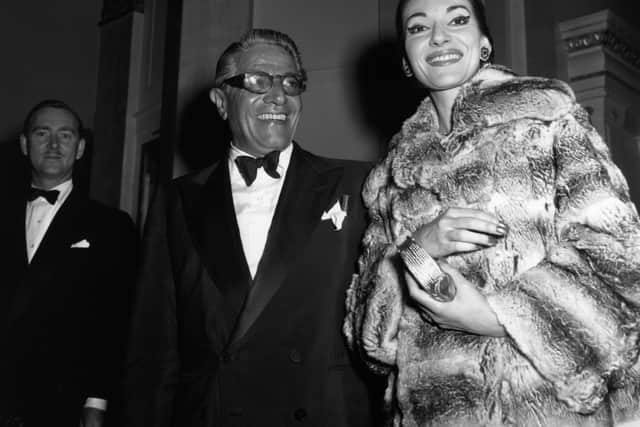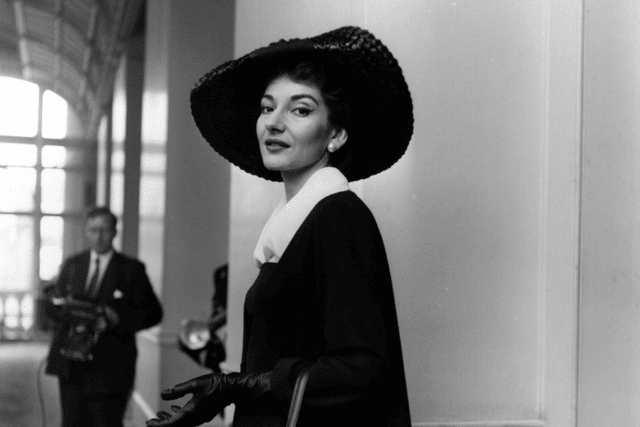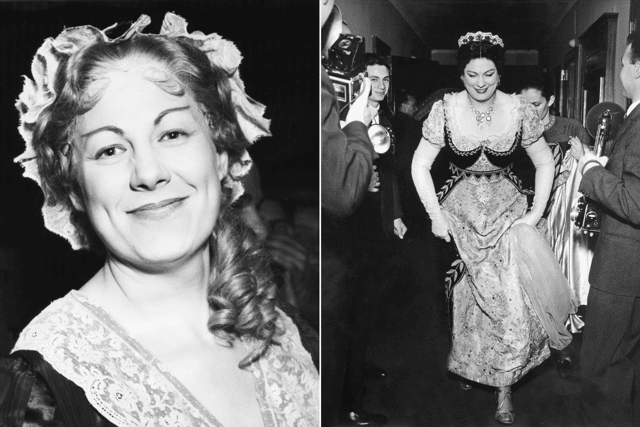Maria Callas | The trials and tribulations of the operatic soprano, from Aristotle Onassis to Renata Tibaldi
and live on Freeview channel 276
Hers was a life full of triumphs and tribulations, with a sensational operatic voice tempered by a reputation of being one of the original divas. Celebrated by many, including her record label that continues to generate ample revenue through her works, criticised by those who crossed her path, Maria Callas’ life was one full of trials and tribulations as many musicians in later years can attest to.
Attention once again focuses on the Greek-American singer with a biopic about her life, ‘Maria,’ starring Angelina Jolie set to arrive in cinemas in 2024 helmed by director Pablo Larraín to conclude his trilogy of ‘lady-with-heels’ films, following on from 2016’s ‘Jackie’ - based around the life of Jackie Kennedy after the assassination of JFK - and 2021’s biopic based around the life of Princess Diana with ‘Spencer’ starring Kristen Stewart.
Advertisement
Hide AdAdvertisement
Hide AdWhile there is plenty that Larraín can draw from, the synopsis of the film is said to focus on the opera superstar’s final days living in Paris, France during the 70s. Living in isolation, perhaps due to her temperament, Callas died alone at the age of 53 from heart failure, but her legacy within classical music circles continues to live on to this day. Her meteoric rise and notoriety has led to her appearing in countless references in popular culture - including Monica Bellucci portraying her in the theatrical show ‘Maria Callas' Letters and Memoirs,’ which debuted in 1999.
Biopics of course being biopics, we’re pretty sure that ‘Maria’ won’t merely focus on the high points of Callas’ life, especially with the dearth of controversy and salacious relevations that came out during her final years and after her death. As demonstrated in Larraín’s previous works, he is not one to shy away from those moments, but if ‘Spencer’ is any example, those downbeat moments are often offset by empathetic flourishes where, despite how hardened his subject may be, we feel a degree of sympathy for his characters.
So will ‘Maria’ be of a similar ilk? Perhaps Larraín will be looking at some of these trying moments in the life of the singer throughout his forthcoming movie - moments that elicited the interest of the general public and perhaps the start of our voyeuristic interest in the private lives of musicians…
Maria Callas, Aristotle Onassis and Jackie Kennedy


The relationship between opera singer Maria Callas and shipping magnate Aristotle Onassis was one of the most dramatic and talked-about affairs of the 20th century. It was a complex and passionate love affair, marred by betrayal, jealousy, and heartbreak. Callas and Onassis first met in Venice in 1957, while Callas was married to Giovanni Battista Meneghini. The pair, attracted to both their intellects and their positions of power, embarked on an affair that garnered a great amount of press at the time - leading to Callas leaving her husband and, in 1960, Onassis finally leaving his wife - the Greek-French socialite, Tina Livanos.
Advertisement
Hide AdAdvertisement
Hide AdThe couple was happy together for several years, and she abandoned her career for what she claimed was an attempt to “[try] to fulfil my life as a woman.” Their relationship though began to strain in the mid-1960s with Onassis having a reputation as a notorious playboy, and constantly surrounded by beautiful women. Callas was deeply insecure, and she was jealous of Onassis's attention to other women. She would be justified by her insecurities - in 1968, Onassis left Callas for Jackie Kennedy, the widow of U.S. President John F. Kennedy. Callas was widely reported to have been devastated by the break-up, with many stating she never truly recovered from it.
Callas and Onassis remained in contact after the breakup, and they even saw each other a few times in secret. However, their relationship was never the same, and they were never able to rekindle their former passion. Onassis died in 1975, and Callas was inconsolable and died two years later.
Health issues - both weight and with her voice


Maria Callas was conscious about her weight throughout her life. She was known for her strict diet and exercise routine, and she was often photographed looking thin and gaunt - an early example of body shaming and a media obsession with the look of a popular musician. Some people admired her dedication to her craft and saw her weight loss as a sign of her commitment to her career. Others criticized her for being too thin and unhealthy.
Though she at times attributed the motivation regarding her weight as a means to improve her vocal technique, biographers have since believed part of it might have been to continue to please her lovers, including Aristotle Onassis. There is evidence that being overweight can put a strain on vocal cords, especially when they are required to bellow out such powerful moments during performances but sadly, the weight loss had a different effect.
Advertisement
Hide AdAdvertisement
Hide AdIt led to vocal strain and a weakening of her vocal cords, with her diet, which reportedly consisted mainly of salads and chicken, may have been inadequate for her vocal needs alongside the sheer physical exertion she placed on herself through intense rehearsal schedules and an equally gruelling performance schedule. By the 1970s, she was no longer able to sing on the opera stage.
Decades later, it was revealed that Callas had been diagnosed with dermatomyositis, a neuromuscular disorder that can affect the muscles of the larynx, the voice box. There is also speculation that her eating habits may have been informed by her depression and anxiety, leading to bouts of insomnia - which potentially led to her addiction to barbiturates.
Apparent ‘feud’ with Renata Tibaldi


The similarities between the struggles faced by pop artists in their quest for the perfect performance and the challenges faced by the world of opera are striking. The feud between two great operatic singers, Maria Callas and Renata Tebaldi, is an example of this. Despite this, we, the audience, and even the media will never fully understand what led to their feud.
Their rivalry was fueled by their different vocal styles and personalities, which were often highlighted by the media and their respective fan bases. The tension between them escalated when both singers made public remarks that seemed to criticize each other's abilities and approaches to singing. The root of their feud can be traced back to a vocal recital in Rio de Janeiro in 1951. Tebaldi reportedly performed encores despite an agreement with Callas not to do so, which angered Callas. This incident set the stage for a series of verbal attacks and comparisons between the two sopranos that were perpetuated by their fans and the media.
Advertisement
Hide AdAdvertisement
Hide AdDespite the public tension, both singers recognized each other's talents and contributions to the world of opera. Callas praised Tebaldi's beautiful tone and phrasing, even expressing her admiration for Tebaldi's voice at times. Similarly, Tebaldi, in a later interview, was found listening to Callas's recording of "La Gioconda" and admitted that Callas's version was the best.
Ultimately, the rivalry seems to have been more of a product of media sensationalism and fan competition rather than a genuine animosity between the two artists - similar to Britney v Christina or Oasis v Blur. In later years, they were able to reconcile and appreciate each other's unique talents and contributions to the world of opera.
Comment Guidelines
National World encourages reader discussion on our stories. User feedback, insights and back-and-forth exchanges add a rich layer of context to reporting. Please review our Community Guidelines before commenting.
